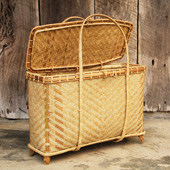Design Resource
Sustainable Craft Practices
Amongst the War Tribe of South Meghalaya
by
Entry to the village appeared as an Ariel view against the sparkle of tin-top roofs dotted at a distance, appearing as mirrored reflections on a sunny day. A stream of ice cool water emanating from a naked pipe appearing from nowhere seemed to welcome the homecoming guest to the village. The stream of water seems to carry with it the faint musical sound of the children in the village school below.
The last 200 steps leading down to the village seemed like a mile long for tired feet. We had finally reached Rangphlang village.
Rangphlang village is nested in Khasi Hills in South Meghalaya, which forms the foothills of the Himalayas. It comprises 8o households with a population of 500 people. People of this village belong to the War Tribe and follow Christianity. Some of the youth were busy with the construction of a church for their community. We gathered from literature, that traditionally the people of the War tribe are known for possessing rich traditional knowledge in the domain of healthcare, fisheries, forest management, pest management, etc. (Tynsong and Tiwari 2008) that have been passed on from many generations.
The population density seemed very sparse and life really tough. We were informed that horticulture, forestry and fisheries were the principal occupations of the people. Most villages would have one or more herbal practitioners and the locals usually use some form of folk medicine for their health care. Most of the herbs are collected from the natural forests or village forests or home gardens indicating the wealth of traditional knowledge the locals possess. Most villages were dependent for health care on local help and these included housewives and elders, traditional birth attendants, herbal healers and bonesetters. Arcenut, orange, betel leaf, jack fruit, bananas, bay leaf, honey and broom grass are the important products of the region.
We were strangers who had come to visit their village and the village head-man felt it an honour to host us. Food comprised of the staple diet of the local rice, fish and meat served with their homemade brew.
The locals tread the long distance up the mountain on foot once a week on market day at Thangsning. Here they collect process and market a large variety of non-timber forest products and medicinal and aromatic plants such as Cinnamomumtamala, bamboo, honey, banana, mushrooms, nuts, tubers, edible worms, insects and leafy vegetables from the forests.




























